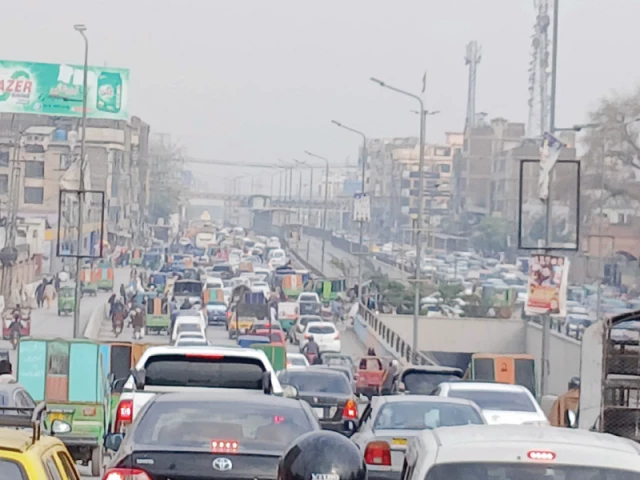Peshawar buckles under urban sprawl
As the city's population continues to expand, lack of long-term proactive planning has deteriorated its living condit

Once celebrated as the "City of Flowers", Peshawar now struggles to live up to its poetic title. The air that once carried the sweet scent of blooming apricots and the gentle rustle of orchard leaves now hangs heavy with dust, smoke, and the cacophony of honking horns. A city that was once admired for its natural beauty and cultural richness has descended into chaos, a casualty of unchecked population growth, political apathy, and haphazard urban development.
Peshawar's transformation began in earnest during the 1980s, when the Soviet-Afghan war sent a huge influx of refugees across the border into Pakistan. Many of them settled in and around Peshawar, altering the city's demographic landscape. In the following decades, Peshawar became the preferred refuge for internally displaced persons from the tribal belt, who were fleeing military operations, insurgency, and insecurity. Over time, the refugee camps evolved into permanent neighborhoods, and the temporary shelters turned into sprawling, unregulated settlements.
The resultant population boom has been relentless. According to the 2023 Digital Census, the population of Khyber-Pakhtunkhwa reached 40.8 million, up from 35.5 million in 2017: an increase of 5.3 per cent in just six years. While the majority, 34 million, still reside in rural areas, the urban population has swelled dramatically. Peshawar alone grew from 4.3 million in 2017 to 4.7 million in 2023, at an annual growth rate of 1.5 per cent.
For Peshawar, the results of this rapid urbanization are visible in every corner. The roads, once adequate for a smaller population, are now choked with vehicles. According to Chief Traffic Officer Haroon Rashid, over 500,000 vehicles ply the city's roads daily. Despite the introduction of the Bus Rapid Transit (BRT) system in 2020, locals' heavy reliance on illegal rickshaws, unregistered vehicles, and a lack of public discipline continue to worsen road congestion and deteriorate air quality.
Dr Rashid Rehman, an urban infrastructure specialist at the University of Engineering and Technology (UET) Peshawar, believed the city was facing a systemic failure. "Urban development continues to expand horizontally, devouring agricultural land and pushing the city's boundaries into rural areas. The lack of long-term strategic planning and zoning regulation is responsible for the chaos. High-rise buildings, for instance, could reduce the strain on land and services, but most housing schemes continue to promote large, detached homes. Weak enforcement of building codes has led to the construction of commercial plazas and residential complexes without adequate parking, water supply, or waste disposal systems," highlighted Dr Rehman.
K-P's Minister for Local Government and Rural Development, Arshad Ayub, acknowledged the city's growing pains but insisted that efforts were being made to improve conditions. "Five new flyovers are under construction and the Ring Road will be expanded to divert traffic from the city center. The upcoming provincial budget includes significant allocations for urban development in Peshawar, including the procurement of new buses for the BRT system and stricter regulations for commercial and residential construction," claimed Ayub.
However, critics argued that such projects were reactive rather than proactive. Environmentalists warned that the loss of green spaces was not just a cosmetic issue but a threat to public health and ecological balance. Peshawar has lost many of its parks and orchards to unregulated construction due to which tree cover in the city has declined sharply.
The sense of loss is palpable among older residents, who remember a very different city. Haji Tahir Khan, a 60-year-old shopkeeper in Saddar Bazaar, recalled a time when the city was not only cleaner but also more livable. "We had space to breathe, walk, and sit under a tree," he said. "Now, even finding a parking spot is a daily struggle. The roads are full, the air is dirty, and the water is getting scarce. Is this the progress we were promised?"



















COMMENTS
Comments are moderated and generally will be posted if they are on-topic and not abusive.
For more information, please see our Comments FAQ